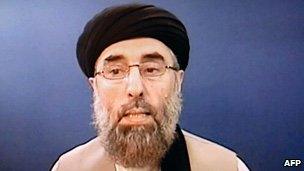Afghan rebel group offers truce terms
- Published

A leading Afghan insurgent group has told the BBC it would agree to a ceasefire if US-led coalition forces stayed in their main bases after announcing a timetable for withdrawal from the country.
Hezb-e-Islami, viewed as the country's most important rebel group after the Taliban, said they had already held talks with the Americans.
Habib-ur-Rahman, son of Hezb-e-Islami chief Gulbuddin Hekmatyar, said his father was willing to stop fighting if the US agreed to withdraw.
The Taliban this week rejected talks while Western forces remain.
Hezb-e-Islami and the Taliban share common enemies - the central government and foreign forces - but there have been deadly clashes between the uneasy allies over local territory.
Gulbuddin Hekmatyar is regarded as one of the three main insurgent leaders, along with Mullah Omar (Quetta Shura Taliban) and Sirajuddin Haqqani (Haqqani network Taliban).
During an hour-long exclusive interview with the BBC, Mr Hekmatyar's son, Habib-ur-Rahman, said: "We have held talks with the Afghan government and the Americans.
"We sent a delegation to talk and reach a consensus with the parliament and the US," said Mr Rahman.
"Only Hezb-e-Islami agrees that war is not the solution. But the Americans are sending 30,000 more troops in.
"They say 'we will suppress our opponents and then evolve a new strategy for Afghanistan'."
Mr Rahman said this was counter-productive. But he also said he believed the Americans would return to the negotiating table soon.
"They will return as they know they cannot stay in Afghanistan indefinitely. The main thing for the war to end is for the Americans to leave," he said.
Mr Rahman said Hezb-e-Islami had proposed a "very rational plan" for "a dignified withdrawal".
He added that a ceasefire was also possible while US troops remained in Afghanistan.
"If they remain in their bases, then we will not attack them," he said.
Mr Rahman also claimed that al-Qaeda was "not an issue" in Afghanistan, as the war was being waged by Afghans: "There is not a single Arab among them; most of the Arabs have left for Iraq."
Mr Rahman said he had only read about Osama Bin Laden's whereabouts in the media, adding that he did not believe the al-Qaeda chief was in Afghanistan.
He also denied that Pakistan had provided a helping hand to the militants.
"In fact, Pakistan has been helping out the coalition forces by detaining and arresting the mujahideen," he said.
Earlier this week, Taliban leader Mullah Omar said there was no prospect of peace talks between the militants and the Afghan government.
He said "rumours of negotiation" were a ploy by Western powers to "cover up" their military defeat in Afghanistan.